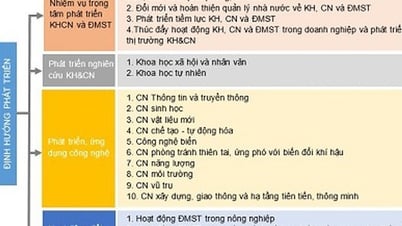Proposal to adjust minimum wage to increase by 6% from July 1, 2024
The Ministry of Labor, War Invalids and Social Affairs is drafting a Decree regulating the minimum wage for employees working under labor contracts.
In the draft Decree regulating the minimum wage for employees working under labor contracts, the Ministry of Labor, War Invalids and Social Affairs proposed to adjust the minimum wage to increase by 6% compared to the current level to apply from July 1, 2024.
Regarding the minimum wage, the Ministry of Labor, War Invalids and Social Affairs proposed to regulate the monthly minimum wage according to 4 regions: region I is 4,960,000 VND/month, region II is 4,410,000 VND/month, region III is 3,860,000 VND/month, region IV is 3,450,000 VND/month.
According to the Ministry of Labor, War Invalids and Social Affairs, the above minimum wage increases from VND200,000 - VND280,000 (equivalent to an average rate of 6%) compared to the current minimum wage.
The above minimum wage adjustment is about 2% higher than the minimum living standard of workers until the end of 2024 to improve the living standard for workers; it is expected to basically ensure the minimum living standard in 2025 (partially calculating the CPI of 2025 into the minimum living standard so that workers can enjoy it from mid-2024).
This adjustment level shares and harmonizes the interests of workers and businesses, paying attention to improving the lives of workers while ensuring the maintenance, recovery and development of business production. 100% of the members of the National Wage Council agree and recommend the Government to adjust according to this level.
The Ministry of Labor, War Invalids and Social Affairs proposed to regulate the minimum hourly wages according to 4 regions: region I is 23,800 VND/hour, region II is 21,200 VND/hour, region III is 18,600 VND/hour, region IV is 16,600 VND/hour.
According to the Ministry of Labor, War Invalids and Social Affairs, the hourly minimum wage continues to be determined based on the equivalent conversion method from the monthly minimum wage and standard working time as prescribed by the Labor Code.
This is the method that ILO experts have recommended Vietnam to choose and have used when calculating the minimum hourly wage in 2022. 100% of the members of the National Wage Council agreed and recommended the Government to adjust according to this level.
Zoning areas and principles for applying basic zoning are inherited according to the current list of regulations. In addition, the names of some areas have been reviewed and updated after changes due to the need to rearrange administrative boundaries according to Resolutions of the National Assembly Standing Committee and areas with changes in infrastructure, labor market development level, investment attraction areas, etc. at the request of the Provincial People's Committee, specifically:
Adjust from region II to region I for: Quang Yen town, Dong Trieu town, Uong Bi city, Mong Cai city of Quang Ninh province.
Adjust from region III to region II for: Thai Binh city of Thai Binh province; Thanh Hoa city, Sam Son city, Nghi Son town, Bim Son town of Thanh Hoa province; Ninh Hoa town of Khanh Hoa province; Soc Trang city of Soc Trang province.
Adjust from region IV to region III for: Thai Thuy district, Tien Hai district of Thai Binh province; Trieu Son, Tho Xuan, Yen Dinh, Vinh Loc, Thieu Hoa, Ha Trung, Hau Loc, Nga Son, Hoang Hoa, Nong Cong districts of Thanh Hoa province; Ninh Phuoc district of Ninh Thuan province.
The regional adjustment of the above localities aims to create a reasonable balance in labor prices between neighboring localities, because the above localities have more developed labor markets, formed industrial zones and clusters, significantly improved infrastructure conditions, and are adjacent to other localities with higher minimum wages.
What benefits will workers enjoy if the regional minimum wage is officially increased?
Thus, if the official increase in regional minimum wage on July 1, 2024 is approved, workers will enjoy significant accompanying benefits.
First, increase monthly salary.
According to Article 90 of the 2019 Labor Code, wages are regulated as follows: Wages are the amount of money that an employer pays to an employee according to an agreement to perform work, including wages according to work or position, salary allowances and other supplements.
Wages for jobs or positions must not be lower than the minimum wage.
Employers must ensure equal pay, without gender discrimination, for employees doing work of equal value.
Second, increase severance pay.
According to Article 99 of the 2019 Labor Code, in case of work stoppage, employees will be paid as follows:
If due to the employer's fault, the employee shall be paid full salary according to the labor contract.
If it is the employee's fault, he/she will not be paid; other employees in the same unit who have to stop working will be paid at a rate agreed upon by both parties, but not lower than the minimum wage.
If there is an electrical or water problem that is not the employer's fault, or due to a natural disaster, fire, dangerous epidemic, enemy attack, relocation of the working location at the request of a competent state agency, or for economic reasons, the two parties shall agree on the salary for the suspension of work as follows: In case of suspension of work for 14 working days or less, the salary for the suspension of work shall be agreed upon not to be lower than the minimum wage; In case of suspension of work for more than 14 working days, the salary for the suspension of work shall be agreed upon by the two parties, but it must be ensured that the salary for the suspension of work for the first 14 days shall not be lower than the minimum wage.
Third, increase the minimum wage when changing jobs.
Pursuant to Clause 3, Article 29 of the 2019 Labor Code, the regulations on transferring employees to do work other than the labor contract stipulate: Employees transferred to do work other than the labor contract are paid according to the new job.
If the salary of the new job is lower than the salary of the old job, the salary of the old job will be kept the same for a period of 30 working days.
The salary for the new job must be at least 85% of the salary for the old job but not lower than the minimum wage.
Fourth, only those who cause greater damage must compensate.
According to Clause 1, Article 129 of the 2019 Labor Code, the responsibility for compensation for damages is stipulated as follows: Employees who damage tools, equipment or otherwise cause damage to the employer's property must compensate according to the provisions of law or the employer's internal labor regulations.
In case an employee causes non-serious damage due to negligence with a value not exceeding 10 months of the regional minimum wage announced by the Government applicable at the employee's workplace, the employee must compensate at most 03 months of salary and have it deducted monthly from the salary according to the provisions of Clause 3, Article 102 of this Code.
Fifth, increase social insurance contributions.
According to Article 5 of the Procedure for collecting social insurance, health insurance, unemployment insurance, occupational accident and disease insurance; managing social insurance books and health insurance cards issued with Decision 595/QD-BHXH in 2017 on contribution levels and responsibility for contribution as prescribed in Article 85 of the Law on Social Insurance 2014, Article 86 of the Law on Social Insurance 2014 and implementing documents, specifically as follows:
In which, in Clause 2, Article 6 of the Procedures for collecting social insurance, health insurance, unemployment insurance, occupational accident and disease insurance; managing social insurance books and health insurance cards issued with Decision 595/QD-BHXH in 2017: Monthly salary for compulsory social insurance payment according to the provisions of Article 89 of the Law on Social Insurance and implementing documents.
Specifically, the monthly salary for compulsory social insurance contribution prescribed in this Clause shall not be lower than the regional minimum wage at the time of contribution for employees doing the simplest job or position under normal working conditions.
Workers doing jobs or positions that require trained or apprenticed workers (including workers trained by the enterprise itself) must be paid at least 7% higher than the regional minimum wage.
Employees doing jobs or positions with arduous, toxic, or dangerous working conditions must have their salaries at least 5% higher; employees doing jobs or positions with especially arduous, toxic, or dangerous working conditions must have their salaries at least 7% higher than the salaries of jobs or positions of equivalent complexity, working under normal working conditions.
Sixth, increase unemployment insurance premiums.
In Clause 2, Article 15 of the Procedures for collecting social insurance, health insurance, unemployment insurance, occupational accident and disease insurance; managing social insurance books and health insurance cards issued with Decision 595/QD-BHXH in 2017: Monthly salary for paying unemployment insurance is prescribed in Article 58 of the Law on Employment and implementing documents.
Specifically, for employees who pay unemployment insurance according to the salary regime decided by the unit, the monthly salary for paying unemployment insurance is the salary used as the basis for paying compulsory social insurance as prescribed in Clause 2, Article 6. In case the employee's monthly salary is higher than 20 times the regional minimum wage, the monthly salary for paying unemployment insurance is equal to 20 times the regional minimum wage.
Seventh, increase the maximum unemployment benefit level.
According to Article 50 of the 2013 Law on Employment, the level, duration and time of unemployment benefits are as follows:
The monthly unemployment benefit is equal to 60% of the average monthly salary for unemployment insurance contributions of the 6 consecutive months before unemployment, but not exceeding 5 times the basic salary for employees subject to the salary regime prescribed by the State or not exceeding 5 times the regional minimum wage as prescribed by the Labor Code for employees paying unemployment insurance according to the salary regime decided by the employer at the time of termination of the labor contract or employment contract.
Wisdom
Source







































































































Comment (0)